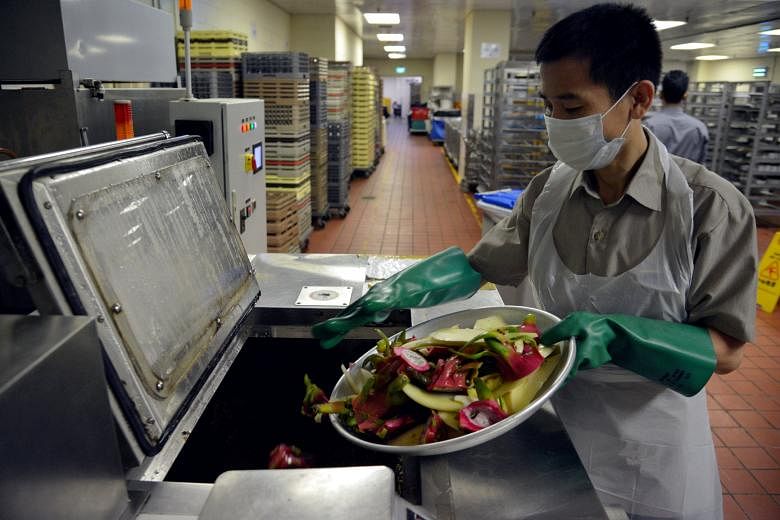SINGAPORE - The National Environment Agency (NEA) has committed $1.76 million to a new fund that will help alleviate the problem of food wastage in Singapore.
The agency on Thursday (May 7) announced the Food Waste Fund, which will cover the cost of implementing food waste treatment solutions for businesses.
The fund will be open for applications to organisations such as companies, non-profit organisations and managing bodies like management corporation strata titles (MCST) from May 18 to Feb 28, 2021.
NEA said that the fund is in line with "efforts to secure Singapore's climate resilient future and help companies transition towards a zero-waste economy amid the current challenging economic conditions".
The fund is capped at $100,000 per applicant and covers the capital cost of food waste treatment systems, accompanying equipment such as bin lifters and infrastructural improvements.
It will be disbursed in two stages, with the first 50 per cent of the approved grant disbursed upon installation and commissioning of the food waste treatment system.
For example, the fund will offset the cost of getting recycling equipment to covert food waste into other products such as animal feed.
The fund received the stamp of approval from industry associations, including the Singapore Food Manufacturing Association, Singapore Hotel Association and Singapore Manufacturing Federation, which said the grant will benefit companies that are keen to integrate food waste management practices into their businesses.
The associations also told NEA that the shorter disbursement period of the fund was attractive since applicants will be able to claim the full grant in six months.
Executive director of Singapore Hotel Association Margaret Heng said: "Sustainability has become an important element of the hospitality business... Since dining is an integral part of the hotel experience, NEA's commitment to responsible food waste management will strengthen Singapore's position as the leader in sustainable tourism."
Food wastage continues to be an issue in Singapore even as the amount of food waste disposed last year was one of the lowest in recent years, following a downward trend and with food waste recycling on the rise.
Yet food waste still accounts for about 10 per cent of all waste generated in Singapore, while the food recycling rate still remains relatively low, at 18 per cent last year.
Even as the Food Waste Fund will encourage organisations to treat and recycle food waste, NEA said the preferred way to manage food waste is to minimise wasting food at the outset.
Unrecycled food is being disposed of at waste-to-energy plants, and this is not sustainable in the long run.
Not only much effort and resources go into collecting and disposing of food waste, but the waste also contaminates recyclables and compromises recycling efforts.
In addition, the Semakau Landfill, which is Singapore's only landfill, will soon reach its maximum capacity and is projected to run out of space in 2035.
From 2024, owners and operators of commercial and industrial premises where large amounts of food waste are generated, such as large hotels and malls, will be required to segregate their food waste for treatment.
NEA said the fund also aims to help companies adopt food waste segregation and treatment ahead of the mandatory requirement.
Organisations can get more information and apply for the fund from May 18 by going to the NEA Food Waste Fund webpage.


